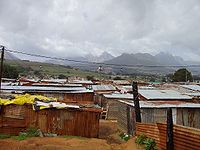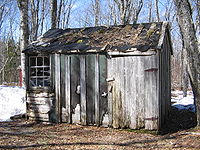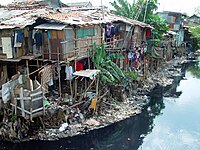Shack: Difference between revisions
shacks |
wrong grammer, Incorrect informatoin |
||
| Line 4: | Line 4: | ||
A '''shack''' is a type of small, often primitive shelter or dwelling. Like [[hut]]s, shacks are constructed by hand using available materials; however, whereas huts are usually rural and made of natural materials (mud, rocks, sticks, etc.) shacks are generally composed of [[waste picker|scavenged]] man-made materials like abandoned construction debris, repurposed consumer waste and other useful discarded objects that can be quickly acquired at little or no cost and fashioned into a small [[dwelling]]. |
A '''shack''' is a type of small, often primitive shelter or dwelling. Like [[hut]]s, shacks are constructed by hand using available materials; however, whereas huts are usually rural and made of natural materials (mud, rocks, sticks, etc.) shacks are generally composed of [[waste picker|scavenged]] man-made materials like abandoned construction debris, repurposed consumer waste and other useful discarded objects that can be quickly acquired at little or no cost and fashioned into a small [[dwelling]]. |
||
In areas of |
In areas of low [[population density]] and low poverty, shacks are often the most prevalent form of housing; it is possible that up to a billion people worldwide live in shacks.<ref>Planet of Slums, Verso, 2006</ref> Fire is a significant hazard in tight-knit shack settlements.<ref>[http://www.abahlali.org/node/4013 A Big Devil in the jondolos: A report on shack fires by Matt Birkinshaw]</ref> Settlements composed mostly or entirely of shacks are known as [[slums]] or [[shanty town]]s. |
||
In [[Australian English]] ''shack'' can also refer to a small holiday house with limited conveniences, for instance it may not have running water or electricity. |
In [[Australian English]] ''shack'' can also refer to a small holiday house with limited conveniences, for instance, it may not have running water or electricity. |
||
In oilfield drilling (Canada) a shack can also be the word for a |
In oilfield drilling (Canada) a shack can also be the word for a well site trailer. Structures that were once notorious among oilfield workers for being cramped, uncomfortable and generally unpleasant to be in are now no longer good enough for companies that are serious about employee retention. |
||
<gallery class="center" caption="" widths="200px" heights="170px"> |
<gallery class="center" caption="" widths="200px" heights="170px"> |
||
Revision as of 13:50, 2 November 2017

A shack is a type of small, often primitive shelter or dwelling. Like huts, shacks are constructed by hand using available materials; however, whereas huts are usually rural and made of natural materials (mud, rocks, sticks, etc.) shacks are generally composed of scavenged man-made materials like abandoned construction debris, repurposed consumer waste and other useful discarded objects that can be quickly acquired at little or no cost and fashioned into a small dwelling.
In areas of low population density and low poverty, shacks are often the most prevalent form of housing; it is possible that up to a billion people worldwide live in shacks.[1] Fire is a significant hazard in tight-knit shack settlements.[2] Settlements composed mostly or entirely of shacks are known as slums or shanty towns.
In Australian English shack can also refer to a small holiday house with limited conveniences, for instance, it may not have running water or electricity.
In oilfield drilling (Canada) a shack can also be the word for a well site trailer. Structures that were once notorious among oilfield workers for being cramped, uncomfortable and generally unpleasant to be in are now no longer good enough for companies that are serious about employee retention.
-
Shacks in Kayamandi, South Africa
-
In relatively affluent areas, shacks are often used for storage or have been abandoned.
References
- ^ Planet of Slums, Verso, 2006
- ^ A Big Devil in the jondolos: A report on shack fires by Matt Birkinshaw




